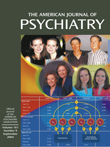Psychiatric Disorders Among Offspring of Depressed Mothers: Associations With Paternal Psychopathology
Abstract
OBJECTIVE: The association between maternal depression and offspring dysfunction is well documented; however, little attention has been paid to psychopathology in the partners of these depressed mothers or to how paternal psychopathology might influence the relationship between maternal depression and offspring dysfunction. The purpose of this study was to explore whether major depression and/or antisocial behavior tended to occur more frequently among partners of depressed mothers (compared to partners of nondepressed mothers) and to examine how these paternal disorders related to offspring psychopathology. METHOD: Participants were drawn from the Minnesota Twin Family Study, a community-based study of twins and their parents. Depressed and nondepressed mothers, their partners (the biological fathers of the twins), and their 17-year-old offspring were included. Structured interviews were used to assess participants for the presence of major depression, conduct disorder, and adult antisocial behavior. RESULTS: Depressed mothers tended to partner with antisocial fathers. Depression in mothers and antisocial behavior in fathers were both significantly and independently associated with offspring depression and conduct disorder. No interactions of the parental diagnoses with each other or with the gender of the offspring were found. CONCLUSIONS: Many offspring of depressed mothers experience the additional risk of having an antisocial father. The implications of these findings for risk among the offspring of depressed mothers are discussed.



